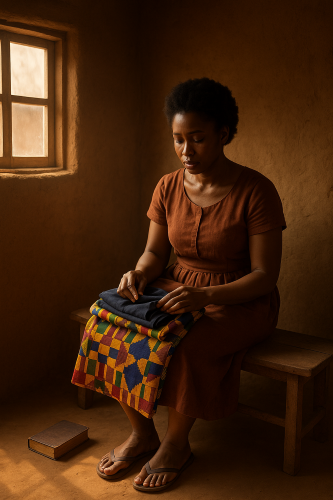BENEATH THE
SILENCE
The village of Adomkrom was as quiet
as ever. Morning mist clung to the clay walls of the homes, and the only sounds
were the distant crow of roosters and the shuffle of sandals on dry earth. No
one ever raised their voice in Adomkrom. Not out of peace, but out of habit.
Out of fear.
Esi had lived here all her life. At
thirty-three, she was known as the pastor’s daughter, the midwife’s apprentice,
the quiet woman who lost her husband and never spoke about it again.
But today, something stirred beneath that silence.
Esi stood in the small compound
house her father built, folding her late husband Kwame’s clothes into a worn
kente bag. It had been two years. Two years since the accident on the Accra
road. Two years of stifled sobs, forced smiles, and avoiding the church pew
they once sat in together. People stopped asking how she was. Grief, after all,
had a time limit in Adomkrom.
As she folded the last shirt, her
hands trembled. She stopped and sat on the wooden bench by the door. Outside,
the mango tree swayed lazily in the breeze, and children’s laughter echoed
faintly from a nearby school.
She reached for her Bible, its cover
fraying like the edges of her patience. Psalm 34:18: “The Lord is close to the
brokenhearted and saves those who are crushed in spirit.†She had read it every
night since Kwame’s passing. She read it again now, not to believe it but
to remember how belief felt.
Just then, the gate creaked.
She looked up. A girl, no more than
sixteen, stood at the entrance. Dusty feet, worried eyes, hands clutched around
her belly.
“Madam Esi,†she said, barely
audible. “Please... I need help.â€
Esi blinked. “What is it?â€
“I think I’m... I think I’m with
child. And I can’t go home.â€
Esi’s heart skipped. Something in
the girl’s trembling reminded her of herself not now, but at nineteen,
when she first found out she was pregnant with Kwame’s baby. That baby never
came. A miscarriage took him in the third month.
She opened the door wider. “Come
inside.â€
The girl, whose name was Aba, sat
quietly, speaking between tears. Her parents were strict churchgoers. Her
father was an elder. Her mother didn’t allow her to wear lipstick, let alone
speak to boys. The boy — a cousin from Accra — had left the village two weeks
ago.
“I can’t go home. They’ll kill me.
If not with canes, then with silence.â€
Esi understood that kind of death
too well.
“Do you believe in God?†Esi asked her gently.
Aba nodded. “But I think He’s
ashamed of me.â€
“No,†Esi said, firmer now. “He’s
not.â€
The words surprised even her.
They sat in silence for a while, two
generations of pain beneath their breath. Then Esi stood.
“You will stay here tonight.
Tomorrow, we’ll see the nurse. We’ll think through everything. One step at a
time.â€
Aba looked up, eyes hopeful, voice
hoarse. “Thank you.â€
That night, as the crickets chirped and lamps dimmed, Esi stared at the ceiling, listening to the quiet. But something had changed. This silence felt different. Not heavy but pregnant with purpose.
News travels like harmattan fire in
Adomkrom. Within a week, whispers filled the market: “Esi is hiding someone’s
daughter.†“They say the girl is pregnant.†“She’s becoming like her mother ..... always picking up people’s burdens.â€
Some said it with disdain. Others
with quiet admiration.
Esi didn’t mind. She walked through
town with her head high. Aba helped with house chores, sometimes sang while
sweeping. Her voice was sweet the kind that could move hearts if anyone
ever let her sing in church.
One afternoon, Esi took her to the
clinic. The nurse confirmed the pregnancy two months along.
As they left, Esi caught a glimpse
of herself in the dusty clinic window standing beside a pregnant teen,
guiding her, shielding her. For the first time in years, she looked like
someone with purpose. Not just a widow. Not just a quiet woman. But someone
useful.
Later that week, Esi’s father came
to visit.
“People are talking,†he said, his
weathered face tight with concern. “You’re not responsible for every troubled
girl in the village.â€
“I know,†she said calmly. “But I’m
responsible for being like Christ.â€
He looked at her long, then nodded.
“Your mother would be proud.â€
That was the first time he had
spoken of her mother in years.
Aba’s presence softened the house.
Her laughter, once hesitant, now filled corners long silenced. She read Psalms
aloud in the evenings, sometimes asked questions that made Esi think.
“Why did God let this happen to me?â€
she asked one night.
Esi thought for a moment. “Maybe
because He knew you’d survive it and help someone else survive too, one
day.â€
Aba leaned into her shoulder. “Like
you’re helping me.â€
As the months passed, Esi found
herself praying again not just out of ritual, but hope. She volunteered
at the church clinic again. People began stopping by for advice, asking for
prayers. Even the church’s women’s fellowship invited her to speak the first
time since Kwame’s death.
She stood before them, heart
thudding. “Sometimes,†she said, “grief buries our voices. But beneath that
silence, God is still working. He never left. I’m standing here to tell you
healing may not shout. But it speaks.â€
There was silence after she spoke then tears. Then applause.
One evening, as the sun dipped low
and cast long shadows across the courtyard, Aba went into labor.
It was too early....barely eight
months.
Esi wrapped her in cloth, called the
village nurse, and paced the floor as Aba screamed.
Memories surged .....her own lost
child, the screams that never ended in a cry, the grief that followed.
But this time, the silence broke.
A baby's wail filled the room ..... sharp, alive, demanding space in the world.
Aba wept. “He’s crying. Oh, he’s
crying.â€
Esi held them both, tears streaming. “Yes, he is. And so are we.â€
They named the baby Kwabena
Nhyira .... “Blessing born on a Tuesday.â€
Esi insisted on adding “Kwameâ€
quietly as a middle name. Aba didn’t mind.
That Sunday, the three of them .... Esi, Aba, and baby Kwame — walked into church.
People whispered, stared, some
smiled, some didn’t. But Esi felt no shame.
She felt peace.
She sat in her old pew. The same one
she once shared with her late husband. She looked up at the cross.
And for the first time in a long
time, she whispered aloud, “Thank you.â€
Epilogue
A year later, the courtyard was
lively again. Baby Kwame waddled around, giggling. Aba had returned to school,
and Esi now ran a small support group for young women ..... some mothers, some
survivors, some both.
The group was called “Beneath the
Silence.â€
Because now, Esi knew.




No comments yet
Be the first to share your thoughts!